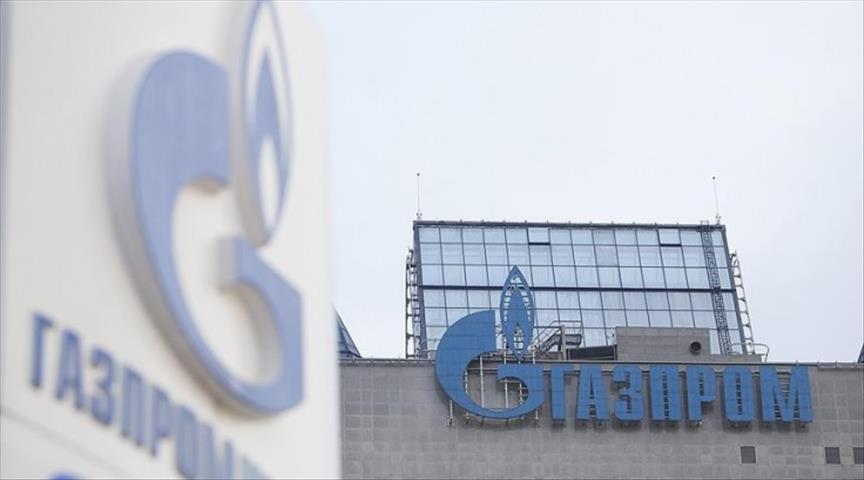Gazprom, the Russian energy giant, is facing a tough road ahead as competition both within and outside Russia, with falling hydrocarbon prices and ongoing sanctions, has resulted in the company losing its dominant position in the natural gas market.
The state-run energy company has recently lost its number one position to Russia’s most valuable and largest oil company; Rosneft. The market capitalization of Rosneft has surpassed Gazprom for the first time in history.
As a sign of shifting trends in global oil and gas markets, Gazprom’s net export profits as well gas production numbers are also in decline.
“I call this the Gazprom phenomenon,�� Fares Kilzie, chairman of the board of directors at Creon Energy told Anadolu Agency.
Despite its huge capacity and strong position in the gas market, Kilzie stressed that the company is actually in debt and its capitalization is not rising but dwindling.
According to data from Russia’s Federal Custom Service, Gazprom’s 2015 export revenue has dropped by 23 percent to $41 billion, while gas export volumes between 2008 and 2014 have also decreased from 184 billion cubic meters (bcm) to 159 bcm.
Gazprom’s gas production between 2004 and 2015 has reached a record low with the drop from 553 bcm to 418 bcm, according to data from Oil and Natural Gas Information Center (ANGI).
“Today, nobody is offering a viable solution to the Russian President or the government,�� Kilzie said.
He explained that there must be a restructuring of Gazprom so the company can be split into several autonomous entities in drilling, transportation and sales.
“I think it will happen soon because right now this structure is destructive to the entire hydrocarbon market in Russia,�� Kilzie said.
Gazprom currently has a legal monopoly on gas exports from Russia. However, the company has been facing increasing competition within the Russian gas market to break this down.
Rosneft and Novatek, Russia’s biggest independent gas producer, has been stepping up their efforts to gain gas export rights.
Both companies have made several official applications and sent letters to Russian President Vladimir Putin requesting permission to export gas to international markets.
The companies have also been increasing their gas production -- Novatek by 5 percent in February 2016 year-on-year to 5,489 bcm and Rosneft by 8.7 percent to 5.286 bcm.
“The Kremlin has a new strategy of liberalizing the Russian gas market in order to adapt to new market conditions,�� Volkan Ozdemir, the head of the Institute for Energy Markets and Policies, EPPEN, said.
Ozdemir said the structure of the Russian gas market aims to be similar to that of the Russian oil market.
“According to this idea, Gazprom will lose its export monopoly, Rosneft and Novatek will start gas exports. Additionally, a company in gas transportation will be created and separated from Gazprom,�� Ozdemir said.
The expert also added that Gazprom is now revising its position by using more flexible gas contracts in parallel with the development of the European gas market.
Historically, almost all of Gazprom’s gas export contracts with European countries were long-term contracts, some spanning 30 years with the contracted gas price indexed to oil prices.
However, with more gas imports becoming available in Europe, mostly through increasing global liquefied natural gas (LNG) supplies, spot gas markets where prices are determined by market participants, have become a more preferable option for European countries.
Meanwhile, another problem that lies on Gazprom’s table is the companies increasing debt. Gazprom's net debt between 2004 and 2014 increased to 1.65 trillion rubles from 500 billion rubles.
The company has recently signed a loan agreement with the Bank of China for ��2 billion -- the company's biggest loan to date.
“Gazprom will always make money. It’s a money making machine. The problem is not how much you can make, but how you are spending those funds,�� Kilzie said, noting the many mega projects that the company has started, but not yet completed.
Another expert, Mikhail Korchemkin, founder and managing director of East European Gas Analysis, said that Gazprom is unlikely to survive in its current structure through the end of 2017.
“In my view, the best way would be to break Gazprom into a state-run transmission company and a number of private gas producers,�� Korchemkin said, adding that such a breakup would also solve the Gazprom-EU conflict over the Third Energy Package while increasing competition in the domestic market.
Gazprom has been facing pressure in the EU, which is its largest client, due to claims that the company has ambitions to control the gas infrastructure in Europe. Such a monopolistic position is against the EU's antitrust laws and the third energy package.
By Emre Gurkan Abay in Moscow
Anadolu Agency
��


